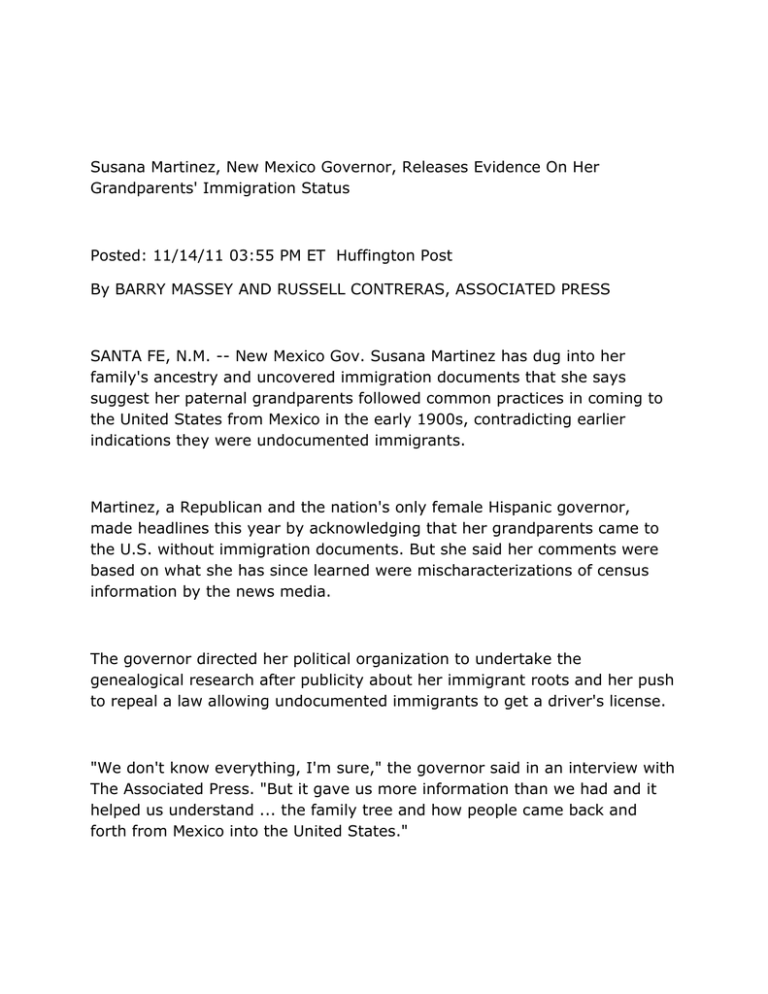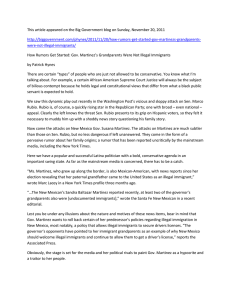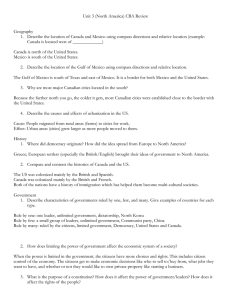Susana Martinez, New Mexico Governor, Releases Evidence On Her
advertisement

Susana Martinez, New Mexico Governor, Releases Evidence On Her Grandparents' Immigration Status Posted: 11/14/11 03:55 PM ET Huffington Post By BARRY MASSEY AND RUSSELL CONTRERAS, ASSOCIATED PRESS SANTA FE, N.M. -- New Mexico Gov. Susana Martinez has dug into her family's ancestry and uncovered immigration documents that she says suggest her paternal grandparents followed common practices in coming to the United States from Mexico in the early 1900s, contradicting earlier indications they were undocumented immigrants. Martinez, a Republican and the nation's only female Hispanic governor, made headlines this year by acknowledging that her grandparents came to the U.S. without immigration documents. But she said her comments were based on what she has since learned were mischaracterizations of census information by the news media. The governor directed her political organization to undertake the genealogical research after publicity about her immigrant roots and her push to repeal a law allowing undocumented immigrants to get a driver's license. "We don't know everything, I'm sure," the governor said in an interview with The Associated Press. "But it gave us more information than we had and it helped us understand ... the family tree and how people came back and forth from Mexico into the United States." The governor's opponents have pointed to her immigrant grandparents as an example of why New Mexico should welcome undocumented immigrants and continue to allow them to get a driver's license. Only New Mexico, Washington and Utah grant driver's licenses or permits to immigrants living without documents in the U.S. Martinez has unsuccessfully asked the Legislature to repeal a 2003 law allowing undocumented immigrants to obtain driver's license. The 1930 U.S. census has been cited in published reports as indicating the governor's grandparents were undocumented immigrants. However, the census only records they were not U.S. citizens at the time they were living in El Paso. The census used a code, "AL" to designate they were "aliens," meaning they were not citizens and had not filed papers declaring their intent to become citizens. It does not indicate their immigration status or whether they were living in the United States legally, according to historians and immigration experts. Michael A. Olivas, an immigration law expert and director of the Institute of Higher Education Law & Governance at the University of Houston, said the documents are "not clear" in indicating that her grandfather was ever an undocumented immigrant by today's definition or maintained legal status throughout his time in the U.S. "There was no such thing as an undocumented immigrant during that time" in the American Southwest, said Olivas, a Santa Fe resident. "There was no secure Mexican border and people came and went with no problem." The research provided Martinez insight into a Mexican-born grandfather, whom she never knew while growing up in El Paso, Texas, along the U.S.Mexico border. She said researchers' findings also corroborated her brother's statements during last year's campaign that she is the great-granddaughter of prominent Mexican revolutionary general Toribio Ortega. On Monday, she visited Cuchillo Parado, Mexico, for a celebration recognizing the father of her father's mother as a revolutionary general who led a band of supporters credited as being the first to take up arms on Nov. 14, 1910 against a decades-long dictator. Martinez said her family's roots in Mexico – regardless of questions surrounding her grandparents immigration status – "really doesn't change my policy at all." "It's not like I started talking about driver's licenses and then all of a sudden realized, `Oh my gosh I came from Mexico and that's a conflict.' I've known where my heritage is from all along," said Martinez. The census lists 1910 as the year her grandfather, Adolfo Martinez, immigrated to the U.S. He worked as a taxi driver and spoke English. Her grandmother, Francisca Martinez, came to the U.S. in 1915, according to the same census document. Her grandparents had U.S. government permits to cross the border on several occasions, according to documents provided to the AP by the governor's political committee. They were dated from 1908 through 1931, and several were issued by the U.S. Department of Labor's immigration service. "So he understood the process and seemed to have followed the process," the governor said of her grandfather. Olivas said the documents show the governor's grandfather traveled freely back and forth from Mexico and the U.S., like many Mexican citizens during the turn of the century. Guadalupe San Miguel, Jr., a history professor at the University of Houston and a noted scholar of Mexican-American history, said it wasn't until a 1924 federal law outlined rules for immigrants with proper documents. "But they did not apply the law to people from the Western Hemisphere," said San Miguel. "It only applied to people from Europe, Africa and Asia, for example." San Miguel said the "concept of undocumented" first emerged in popular literature and among politicians during the Great Depression after lawmakers began complaining about the economy and blaming the growing Mexican-American and Mexican immigrant population for taking jobs. Researchers for the governor found that Martinez's grandfather received a Social Security number in 1962 in Texas. Until researchers assembled their information, the governor said, she had never seen the census or other immigration documents. When questions arose about her grandparent's immigration status, Martinez said, she was unable to turn to her father for answers because he suffers from Alzheimer's disease. He lives in El Paso. Her mother died in 2006. Jay McCleskey, the governor's top political adviser, said the genealogy research included family member interviews and a review of online documents at the National Archives. The research cost several thousand dollars and will be reported on the next financial disclosure by the governor's PAC. ___ Russell Contreras reported from Albuquerque. ___





